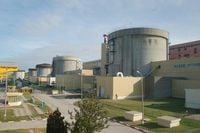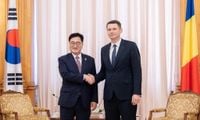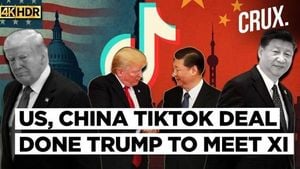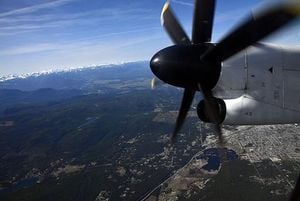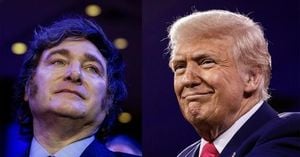On July 25, 2025, Romanian Prime Minister Ilie Bolojan welcomed Woo Won-shik, President of the National Assembly of the Republic of Korea, at Victoria Palace for a high-level meeting that underscored the deepening ties between the two nations. This visit, accompanied by a South Korean delegation, highlighted the strategic partnership that Romania and South Korea have nurtured over 35 years of diplomatic relations, with a focus on expanding cooperation in critical sectors such as civil nuclear energy and defense.
Central to the discussions was the modernization project of Unit 1 at Romania's Cernavodă Nuclear Power Plant. This initiative, a cornerstone of Romania's ambition to solidify its leadership in regional nuclear energy, involves a €1.9 billion contract with Korea Hydro & Nuclear Power Co., a South Korean company working alongside Canadian and Italian partners. Prime Minister Bolojan warmly welcomed this collaboration, emphasizing that it exemplifies the high-value economic partnership between the two countries.
"The involvement of Korea Hydro & Nuclear Power Co. in this major project, alongside partners from Canada and Italy, represents a concrete example of the economic partnership between Romania and the Republic of Korea in high value-added sectors," the Romanian Government stated. Bolojan also stressed Romania's goal to stimulate economic and commercial exchanges with South Korea and expressed keen interest in attracting new South Korean investments in priority projects across shared domains of interest.
The meeting took place in a year of special significance, marking 35 years since Romania and South Korea established diplomatic relations. Their partnership, formally launched in 2008, was further reinforced by a Joint Declaration signed in 2024 that outlines cooperation pathways for the coming decade. This declaration builds upon previous engagements, including former Prime Minister Marcel Ciolacu's official visit to South Korea in December 2022, where discussions spanned political, economic, and security cooperation. Additionally, in April 2024, former President Klaus Iohannis signed the Joint Declaration in Seoul, setting a strategic framework for collaboration in defense, nuclear energy, and foreign trade.
Parallel to these developments, Romania's Senate President Mircea Abrudean met with Woo Won-shik on the same day, expressing gratitude for South Korea's unwavering support in Romania's ongoing accession process to the Organisation for Economic Co-operation and Development (OCDE). Their talks reaffirmed a shared commitment to a consistent and diversified bilateral cooperation, emphasizing political dialogue, parliamentary collaboration, and burgeoning economic exchanges.
In 2023, bilateral trade between the two countries reached an unprecedented $1.5 billion, signaling robust economic momentum. The leaders discussed expanding cooperation into several promising sectors, including the defense industry, infrastructure, information and communications technology, agriculture, and healthcare. Cultural ties also featured prominently, with plans to open a Romanian Cultural Center in Seoul and explore the possibility of a direct flight route between Bucharest and Seoul to bolster tourism and business mobility.
Romania is keen on finalizing evaluations by OCDE committees throughout 2025 to secure membership by 2026. As of April 2025, Romania had completed assessments by 24 of the 25 sectoral committees, securing formal approvals from 14, reflecting significant progress toward meeting OCDE standards.
Further strengthening the bilateral relationship, Sorin Grindeanu, President of the Romanian Chamber of Deputies, also met with Woo Won-shik at the Parliament Palace on July 25. They reaffirmed their dedication to the Strategic Partnership, noting impressive advances in security, defense, energy, technology, and infrastructure.
Grindeanu highlighted South Korean investments that have positioned Romania among the countries with the most advanced civil nuclear programs worldwide. He pointed to the commencement in June 2025 of Europe's first detritiation facility at Cernavodă, a project of strategic importance for the future of nuclear fusion technology. Moreover, he conveyed Romania's interest in attracting South Korean investments to develop the Port of Constanța, emphasizing its enhanced logistical advantages following Romania's recent accession to the Schengen Area.
Expressing appreciation for South Korea's support in Romania's OCDE accession process, Grindeanu underscored the multifaceted nature of the partnership and the mutual benefits it yields.
On the environmental and European integration front, Romania also received strong backing from Germany in its OCDE accession efforts. During a joint press conference in Romania, German Environment Minister Carsten Schneider pledged continued support, emphasizing the importance of protecting the environment and fostering economic growth through renewable energy and circular economy initiatives.
Romanian Environment Minister Diana Buzoianu highlighted Romania's commitment to swiftly implementing the EU's air quality directive, aimed at empowering citizens to protect their health by reducing pollution. She also detailed ongoing legislative efforts to align Romania's fiscal procedures with OCDE standards, including new measures to improve tax transparency and investor confidence.
Germany praised Romania's achievements, particularly the SUMAL program designed to protect forests and combat illegal logging, which has become a model within the European Union. Minister Schneider stressed the shared responsibility of protecting the Danube River, which links Germany and Romania, underscoring the need for joint efforts in water protection.
Romania officially began its OCDE accession process in June 2022, having previously submitted candidacies in 2004 and 2012 and renewed these annually since 2016. The process involves rigorous evaluations by 25 sectoral committees, with Romania aiming to complete all assessments in 2025 to join the organization in 2026. Achieving OCDE membership would signify Romania's alignment with the highest international standards in economic, fiscal, and governance policies, enhancing its attractiveness for foreign investment and strengthening its administrative capacity.
Foreign Minister Oana Țoiu recently discussed Romania's OCDE accession status with Secretary-General Mathias Cormann, reaffirming Romania's firm commitment to internal reforms and alignment with OCDE best practices. They agreed to maintain close dialogue to support Romania's accession goal and emphasized Romania's role in regional cooperation, particularly with neighboring countries such as Moldova, Ukraine, and the Western Balkans.
As Romania advances on multiple diplomatic, economic, and environmental fronts, its strategic partnership with South Korea stands out as a pillar of its international engagement. The modernization of the Cernavodă Nuclear Power Plant, the expansion of bilateral trade, cultural initiatives, and shared commitments to global standards showcase a dynamic relationship poised for continued growth and mutual benefit.
